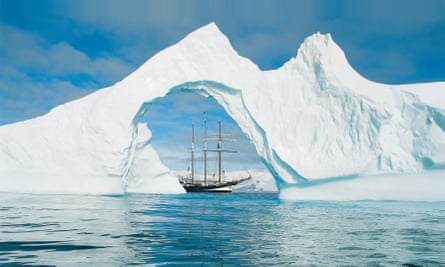On Monday 14 August, when the tide is right, an antique sailing ship will manoeuvre through the lock of Plymouth’s historic Sutton harbour and point herself south-west towards the Canary Islands. It will be the start of a two-year voyage around the world taking in 32 ports and involving thousands of people in a groundbreaking geographical project, Darwin200, which aims, among other things, to inspire the environmental leaders and scientists of the future.
Not only that, adventurous souls can apply to be part of the crew on epic voyages between, for example, Tahiti and the Cook Islands, or Cape Town and the Falklands.
The Oosterschelde, a traditional three-masted Dutch schooner, plans to retrace the route taken by another historic ship almost two centuries ago. In Plymouth on Boxing Day 1831, a young man boarded HMS Beagle and the following day set out on a voyage that would change our world. Not that the 22-year-old Charles Darwin suspected the vast significance the voyage would later have. He was suffering a little of what would later be known as impostor syndrome, wondering if he deserved the opportunity given. Fortunately for us, however, he had the necessary determination and enthusiasm. And that is what Darwin200 founder Stewart McPherson hopes will be the legacy of this project. “We are identifying 200 young naturalists from 200 countries who will become the leaders of the future – young people who can drive change.” En route, the Oosterschelde will touch places as far apart as Cape Verde, Rio, Auckland and Tasmania – all spots Darwin reached.

So far the project has selected 50 young naturalists between 18 and 25: people such as Afonso Nascimento, the son of a fisher from Fernando de Noronha, a remote Brazilian island, who grew up determined to rescue turtles in his homeland and has subsequently saved thousands of them. Like the other selected naturalists, Afonso will get chance to study in one of the 32 ports, linking with existing conservation projects. The mission will be to examine particular species that Darwin identified, from spinner dolphins to carnivorous plants, then report on their current situation and what strategies can help them.
“One determined person can make a huge difference,” says McPherson, a veteran of several BBC geographical series and himself discoverer of 30 new species. “I’ve seen it over and over again. One of our young leaders raised £40,000, bought a derelict peat bog and restored it with native species. Others have led massive tree-planting programmes. We want young people with a raw, burning passion to change the world.”
The scope of this ambitious project, however, does not end there. All through the two-year voyage, a programme of free lectures, experiments and activities will be broadcast from the ship and the 32 ports visited, all accessible through the Darwin200 website, engaging a worldwide audience. Another aspect is weekly competitions, one with a prize that will send a school class and their teacher to the Galápagos to study with botanist Sarah Darwin, the naturalist’s great-great-granddaughter.
In Plymouth the sending-off celebrations take place this weekend with an event at the National Marine Aquarium. The city’s position owes a lot to sailing vessels, being in the perfect position to await the right weather for embarking on long voyages. When the Oosterschelde sails on Monday, it will be with a crew of 24, which is another way enthusiasts can get involved. “We still need crew for some legs of the voyage,” says Gerban Nab, the ship’s Dutch captain. “No previous experience required, just an ability to work as a team.”
after newsletter promotion

Gerban has been sailing the ship for more than 30 years, and this will be the third circumnavigation. “It is very different from other ways of travelling. You are close to the water, the wind and weather. You steer by the stars. When you arrive, you have already achieved something – not like on a plane!”
The Oosterschelde was built in 1917 and made a living tramping around the world with general cargo: coal from Cardiff, oranges from Morocco and Baltic timber. She’s survived hitting a second world war mine, abandonment and many storms. “She was just a cargo ship, nothing special,” says Gerban. “But restored, she is beautiful – every detail. She is gentle in the water; the sails damp the movement.”
Darwin would have appreciated that: HMS Beagle was a notorious tub that made him seasick on every single leg of his epic journey.
For more information see Darwin200 and Visit Plymouth. To join the boat as crew costs from about £690 for five days for those aged over 26, for example up the Chilean coast from Concepción to Valparaíso, and £345 for under-26s

